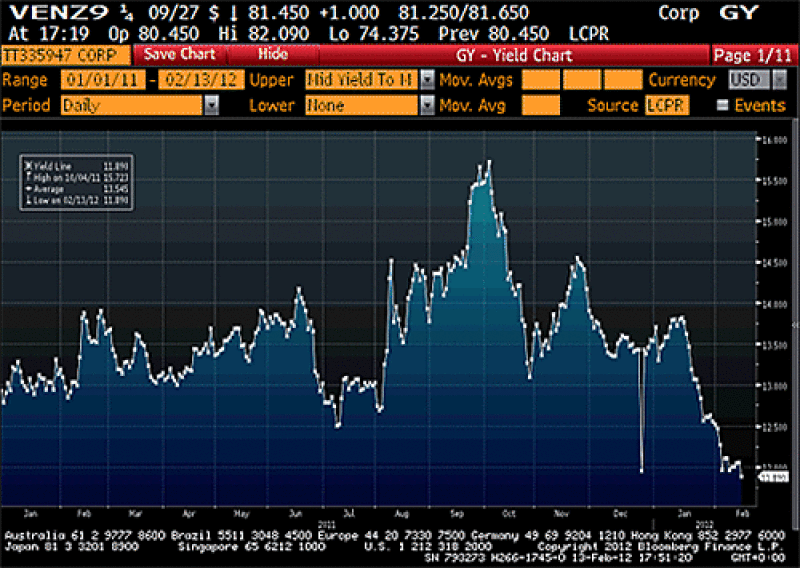The word ‘game-changer’ gets bandied around with unjustified regularity but Chavez’s downfall in Venezuela could prove just that – and, in turn, be the trade of the century for fixed income investors in Venezuelan government bonds. First, the news, via Bloomberg:
| Venezuelan bonds rallied after opposition candidate Henrique Capriles Radonski scored more than 60 percent of the vote in a nationwide primary, a landslide win that analysts said could strengthen his bid to unseat President Hugo Chavez in October elections. ... Capriles, a 39-year-old governor of Miranda state who promises to gradually unwind Chavez-imposed state controls on the economy, won the South American country’s first presidential primary with 1.8 million votes. The margin of victory and stronger-than-expected voter turnout of almost 3 million people increase the possibility of a “democratic and peaceful transition” in 2013, providing support to Venezuelan assets. |
So the opposition is getting more unified. Even though Capriles is still behind in the polls for the presidential elections, markets are getting excited since the opposition candidate clearly has the momentum.
Investors are hoping that it’s game-over for nationalizations, sudden imposition of oil taxes, run-away inflation, blackouts, and opaque government spending. This would potentially be a boon for Venezuela’s creditworthiness. As of 6pm London time, the yield on Venezuela’s benchmark 9.25% bonds due in 2027 fell 20bp to 11.89%, via Bloomberg:

Nomura encapsulates the case for the opposition bulls:
| The Bolivarian Revolution is suffering from heavy attrition: In competitive democracies, long spells in office take a toll on the incumbent’s approval ratings. Venezuela is no exception. - HCR is arguably the best candidate from the opposition to face President Chavez: He is a fresh face, and the old, discredited parties from the Fourth Republic did not support him in the primaries (kind of a “kiss of death”, in reverse). He’s centrist, which positions him to have a shot at attracting the “ni-nis” (neither chavistas nor opposition), which in the end will decide this election. HchF’s [President Hugo Chavez Frias] perceived health: While HchF has been looking healthy, particularly since the end of 2010, and has proclaimed himself to be cured from cancer, any apparent setbacks will improve HCR’s chances. A potential relapse of President Chavez’s health condition would not only constitute a drag on this 24-7 campaigning style, but would also will discourage undecided and independent voters who would be reluctant to choose a President with an uncertain lifespan. l |
But on the flip-side, there are three main hurdles to dismantling President Hugo Chavez Frias (HChF) rule in the October 7 elections:
| HchF’s recovery from an annus horriblus, politically: Although, HchF’s popularity has been picking up since late 2010. While his government’s results have been checkered at best, President Chavez enjoys a tested “teflon effect” which comes very handy at election times. Surging public expenditure: For the first two months of this year, we estimate an increase of 56% in primary spending versus the same period in 2011, with inflation “only” running at 26%. As the opposition is having a tough time getting campaign contributions from the private sector (due to fear of reprisals from the government), this election is unlikely to have a level playing field on this front. Unity issues: Not long ago, the traditional (and discredited) AD and Copei were organizing a “Tococa” (Todos contra Capriles – All against Capriles) front. It would be interesting to see if they throw their still well-oiled electoral machineries behind HCR. |
Net-net, who knows how this tactical bet will pay off. And we have been here before, of course. In June, markets rallied on speculation that the demise of Chavez was nigh, following surgery in Cuba. That proved to be a false dawn.
What’s more, it’s by no means clear whether Chavez’s departure would prove a boon for economic ‘normalization’. Who knows whether the succession mechanism will work well given the concentration of power under Chavez – from foreign policy to subsidies – or whether a policy vacuum will blight the economy.
Bonds' allure
For fixed income investors, the big problem in Venezuela is the huge supply of government bonds, triggered by the need for foreign currency since capital flight and onerous regulations starves the financial system of hard currency. The onslaught of bonds, in turn, causes the rest of the yield curve to adjust upwards in anticipation of new supply. There are enough willing buyers of course – domestic investors face negative real yields on local currency assets given run-away inflation while nationalisation threats reduces the supply of investable assets for the private sector.
But the theory is that a more private-sector orientated business environment, under the opposition, would reduce capital flight risks and allow markets to price in Venezuela’s seemingly alluring economic fundamentals, namely respectable debt-to-GDP ratio and strong cash flows. In Capital Economics’ words:
| For a start, while inflation has remained stubbornly high, it has been fairly stable at 25-30% - far from hyperinflation territory. Meanwhile, despite the fact that public debt has risen sharply in recent years, from 25% of GDP in 2008 to around 50% of GDP currently, it has not yet reached the realms of a debt trap (80+ % of GDP). |
The election has many months ahead and will, no doubt, be subject of multiple twists and turns. But one thing is certain: investor bets on Vennie government bonds that pay off could prove the stuff of legend for years to come.
Further reading:
VENEZUELA: The limits of control - Emerging Markets